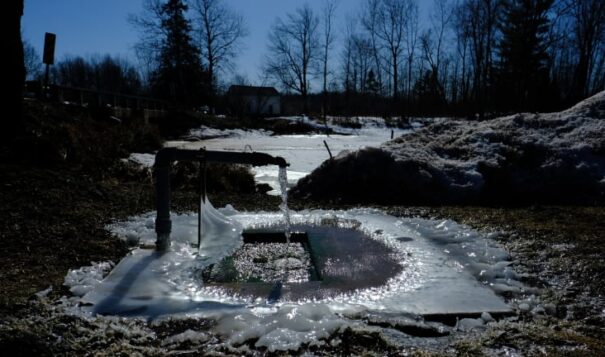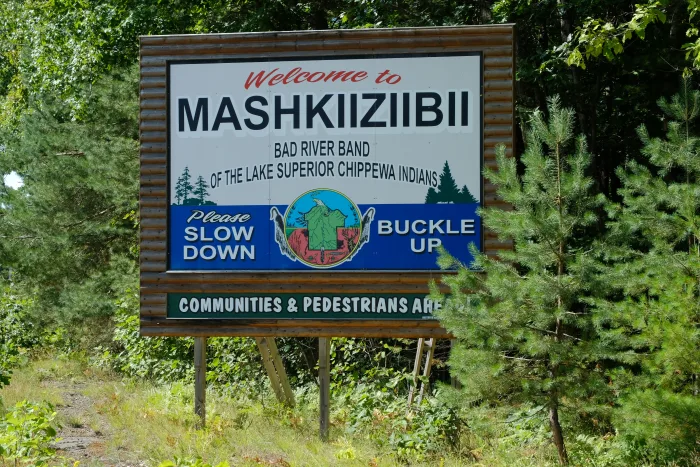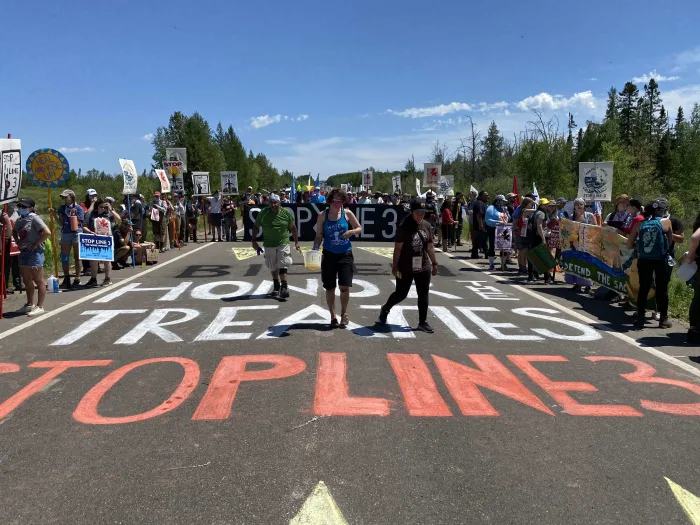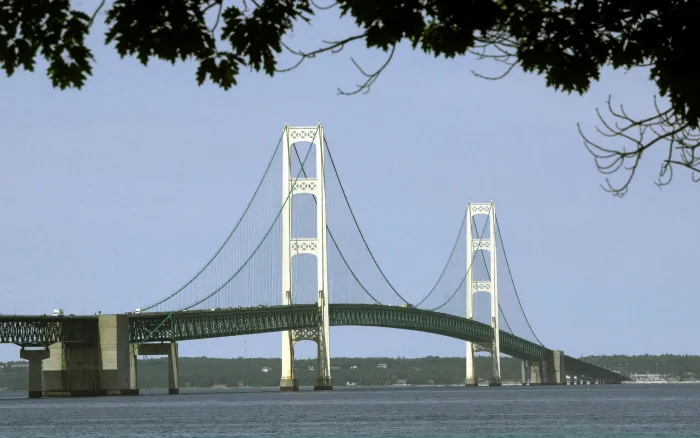News Based on facts, either observed and verified directly by the reporter, or reported and verified from knowledgeable sources.
Tribe asks court to shut down oil pipeline
 An artesian well, shown here in March 2022, provides drinking water for local residents along the Kakagon River that flows through the wild rice sloughs on the Bad River Band of Lake Superior Chippewa lands in Odanah, Wisconsin. The Bad River river is facing erosion that could cause damage to the Enbridge Line 5 pipeline opposed by water protectors. The Kakagon River is part of the Bad River watershed (Photo by Mary Annette Pember/Indian Country Today)
An artesian well, shown here in March 2022, provides drinking water for local residents along the Kakagon River that flows through the wild rice sloughs on the Bad River Band of Lake Superior Chippewa lands in Odanah, Wisconsin. The Bad River river is facing erosion that could cause damage to the Enbridge Line 5 pipeline opposed by water protectors. The Kakagon River is part of the Bad River watershed (Photo by Mary Annette Pember/Indian Country Today)
The Bad River Band of Lake Superior Chippewa are worried that a spill could devastate their land, but Enbridge says a spill is unlikely and is asking the tribe to instead let it reinforce the riverbank, saying the pipeline is critical to the Great Lakes economy
Attorneys for a tribe in Wisconsin argued Thursday that a federal judge should order an energy company to shut down an oil pipeline the tribe says is at immediate risk of being exposed by erosion and rupturing on reservation land.
The Bad River Band of Lake Superior Chippewa asked U.S. District Judge William Conley last week to issue an emergency ruling forcing Enbridge to shut down the Line 5 pipeline after large chunks of riverbank running alongside it were washed away by the river in northern Wisconsin.
The tribe says less than 15 feet of land now stands between the Bad River and Line 5 in four locations on the reservation. In some places, more than 20 feet of riverbank has eroded in the past month alone. Experts and environmental advocates have warned in court that an exposed section of pipeline would be weakened and could rupture at any time, causing massive oil spills.

Enbridge’s engineers contend there is almost no chance the pipeline will be exposed by erosion, let alone rupture, in the next year. The company said in court filings that the tribe has not cooperated with its repeated requests to line the riverbank with sandbags that would protect against erosion.
Enbridge also asked the tribe Monday for a permit to install stabilizing barricades made of trees along the riverbank.
Judge Conley signaled frustration with the tribe’s lack of action as Thursday’s hearing began.
“The band has not helped itself by refusing to take any steps to prevent a catastrophic failure at the meander,” Conley said. “You haven’t even allowed simple steps that would have prevented some of this erosion.”

The Bad River tribe sued Enbridge in 2019 to force the company to remove the roughly 12-mile section of Line 5 that crosses tribal lands, saying the 70-year-old pipeline is dangerous and that land agreements allowing Enbridge to operate on the reservation expired in 2013.
Conley sided with the tribe last September, saying Enbridge was trespassing on the reservation and must compensate the tribe for illegally using its land. But he would not order Enbridge to remove the pipeline due to concerns about what a shutdown might do to the economy of the Great Lakes region.
Instead, Conley ordered Enbridge and tribal leaders to create an emergency shutoff plan for the pipeline last November, saying there was a significant risk it could burst and cause “catastrophic” damage to the reservation and its water supply.
Line 5 transports up to 23 million gallons of oil and liquid natural gas each day and stretches 645 miles from the city of Superior through northern Wisconsin and Michigan to Sarnia, Ontario. If the pipeline were shut down, gas prices would likely increase, refineries would shut down, workers would be laid off and the upper Midwest could see years of propane shortages, according to reports Enbridge submitted in court.

Enbridge has proposed a 41-mile reroute of the pipeline to end its dispute with the tribe and said in court filings that the project would take less than six years to complete. But the Department of Natural Resources has not granted the permits Enbridge needs to begin construction. A draft analysis of the project’s environmental impact submitted in December 2021 received thousands of public comments, with many criticizing the report as insufficient. The company is still responding to the DNR’s requests for more information.
Line 5 has also faced resistance in Michigan, where Enbridge wants to drill a new tunnel under a strait connecting two of the Great Lakes but Michigan Gov. Gretchen Whitmer and Attorney General Dana Nessel have sought to shut down the pipeline. Nessel filed a brief Wednesday in support of the tribe’s request, saying a rupture in Wisconsin would also cause irreparable environmental damage in Michigan.
Dateline:
MADISON, Wis
